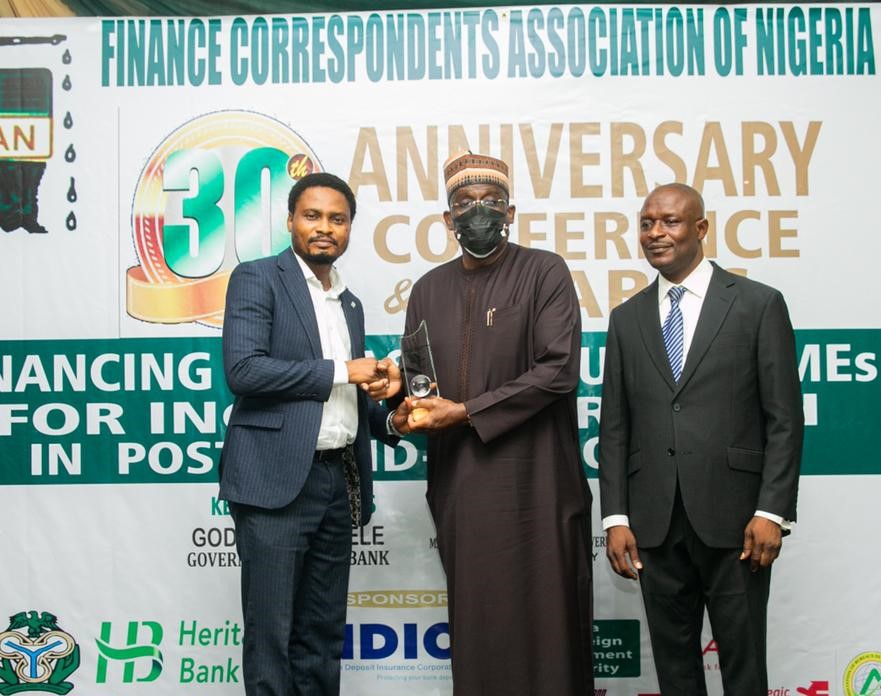E-Financial
Heritage Bank MD Tasks Govt on Policies to Support Private Sector Interventions for Infrastructure Growth

Ifie Sekibo, MD/CEO of Heritage Bank Plc, has called on governments to provide enabling policies that would support private sector interventions to achieve the vision of infrastructural development.

L-R: Blaise Udunze, Team Lead Media and External Relations of Heritage Bank Plc; former Managing Director of Bank of Industry, Waheed Olagunju and the Chairman of Finance Correspondents Association of Nigeria, Titus Nwokoji, during the duo Platinum Awards presented to Ifie Sekibo and Heritage Bank for Outstanding Support towards FICAN and Financial Reporting, respectively at the Finance Correspondents Association of Nigeria’s (FICAN) 30th-anniversary conference and awards with the theme: “Financing Infrastructure & SMEs for inclusive growth in the post-COVID-19 economy,” held in Lagos, weekend.
He made this submission at the Finance Correspondents Association of Nigeria’s (FICAN) 30th-anniversary conference and awards with the theme: “Financing Infrastructure & SMEs for inclusive growth in the post-COVID-19 economy,” held over the weekend in Lagos, where the bank carted away duo Platinum Awards presented to Ifie Sekibo and Heritage Bank for Outstanding Support towards FICAN and Financial Reporting, respectively.
Sekibo who was represented by Olusegun Akanji, Divisional Head, Strategy and Business Solutions, argued that the government cannot solve the country’s infrastructure challenges, noting that it is the private sector that will deliver the solution.
According to him, the government can only provide enabling policies that will support private sector interventions.
“We need the global private sector intervention to help us achieve a vision of infrastructural development,” he said.
He noted that until the country developed an identity management system that delivers value to the citizenry, SMEs will continue to grapple with financing challenges.
He explained that though the banking industry has financed a lot of SMEs in terms of count, that it is the sector that has the largest numbers of bad loans and frauds in terms of count.
MD of FMDQ Group, Bola Koko represented by Yomi Osinubi, Head Private Market, urged Nigeria to conceive a way its domestic capital market could fund the international capital market.
That, he said, was the only way that we could pluck the infrastructure rewards.
“If we want to pluck our infrastructure rewards, first of all we have to conceive of a way our domestic capital market can actually fund capital market.
“But the investors in debt capital market international and debt, money will come into an environment where capital is expected and there is an expectation of good management of those resources and cash flows will come back to it.
“So I think there’s the issue of maybe an underlying structure where we want to put in capital like road infrastructure tax payment.
” If you want SMEs to get the best benefits of infrastructure development in the country, the CBN Governor mentioned the largest areas of course for SMEs which is energy. The second largest is the logistics, movements of cargo around the country,” he said.
Temidayo Obisan, Executive Commissioner, representing the Director General of Securities and Exchange Commission (SEC),Lamido yuguda advised that the nation connected the right duration of money which according to him would be long-term.
“The major thing to identify is that infrastructure is a long-term thing, so it Is essential we connect the right duration of money which is long term capital which is what capital market provides and which sec as a regulator should.
“We have about three surviving infrastructure focus funds in Nigeria now that are totalling almost a 100bn, itching about 90 billion at the moment and there are some that are registered programmes of 200billion,” he said.
More so, the Chairman of FICAN, Titus Chima Nwokoji, said if Nigeria’s infrastructural gap, which is estimated to be N36 trillion annually, is addressed, a lot of the country’s economic challenges will be easily tackled.
“And coming out of COVID-19 pandemic, we know that if the infrastructure is fixed and SMEs thrive, the growth that you see will be faster,” he added.
E-Financial
SEC Tasks Registrars, Other CMOs on Innovations

The Securities & Exchange Commission (SEC) has challenged registrars and other Capital Market Operators (CMOs) to drive innovations and explore new opportunities in unlocking current changes in the global market.

This was stated by Dr. Emomotimi Agama, Director-General, SEC, at the Institute of Capital Market Registrars (ICMR) 14th Annual Conference & Presidential Investiture during the weekend in Lagos.
The theme of the 2025 conference was, “Unlocking Global Value: The evolving market role of capital market registrars in trust, efficiency and innovation.”
Agama who was represented by executive commissioner (Operations), SEC, Mr. Bola Ajomale, charged registrars to remain innovative and proactive, warning that unregulated players could take over their functions if the profession fails to evolve.
In a goodwill message, the Group chairman of NGX Group, Alhaji (Dr.) Umaru Kwairanga, described registrars as ‘the quiet custodians of confidence and credibility’ whose accuracy and efficiency underpin investor trust and corporate governance.
Group Vice President of Dangote Industries Limited, Mr. Olakunle Alake, who delivered a keynote address, outlined three imperatives for the registrar profession.
“Digitization and cybersecurity: embrace digital platforms, but with robust safeguards to protect data integrity. Capacity building and training: continuous education must be non-negotiable. The world is changing too fast for outdated skills. Global benchmarking: aim not just to meet local standards, but to benchmark against global best practices,” he said.
Founder and vice chairman of Emerging Africa Group, Dr. Toyin Sanni, urged registrars to reposition themselves as trusted, tech-enabled partners in the investment value chain.
E-Financial
IFC Unveils $310M Investments to Support Smaller Businesses and Advance Job Creation

IFC has announced investments totaling $310 million in projects that will support the growth of smaller businesses and job creation across several African countries. The projects were announced at the Africa Financial Summit (AFIS), which convened private and public sector representatives from across Africa under the theme of mobilizing domestic capital at scale for development.

The two-day event, co-hosted by IFC, the Jeune Afrique Media Group, and the Kingdom of Morocco, featured discussions among African central bank governors, regulators, financial institutions, and fintech innovators on how Africa can best tap its own resources—and attract more foreign investment—to shape the continent’s financial future, create jobs, and sustainably grow its economies.
On the sidelines of AFIS, IFC announced partnerships with several financial institutions that will channel funds and support towards businesses in Egypt, Ethiopia, and Morocco, helping businesses grow and reach new markets.
The new projects IFC announced are:
- A $50 million financing package to Suez Canal Bank will expand lending to smaller businesses across Egypt, particularly in underserved regions. A quarter of the loan is earmarked for women-owned businesses to help bridge the gender financing gap and boost inclusive growth.
- A $10 million equivalent IFC local-currency risk-sharing facility with Attijariwafa Bank Egypt to expand access to finance for smaller businesses and support job creation. At least a quarter of the loans are earmarked for women-owned businesses, and half to SMEs in vulnerable communities. The initiative is supported by the Prospects Partnership, which supports development for host communities and forcibly displaced people.
- A $250 million IFC risk-sharing facility with newly established Saham Bank will strengthen Morocco’s financial stability and expand access to finance for local businesses. IFC will share up to 50 percent of the credit risk on the bank’s $500 million corporate loan portfolio, helping sustain lending to key sectors. Saham Bank recently acquired Société Générale Marocaine de Banques.
- An IFC advisory services support program for VisionFund to help the microfinancier expand lending to smaller businesses and deepen financial inclusion in Ethiopia. The project will strengthen VisionFund’s capacity in strategic business planning, risk management, and responsible finance, enabling it to reach more underserved entrepreneurs—especially women. This initiative follows IFC’s recent $10 million local currency loan to VisionFund.
Ethiopis Tafara, IFC’s Vice President for Africa, said, “The combination of Africa’s own financial resources with strategic international capital is a potent recipe for growth on the continent. Africa’s entrepreneurs are building companies that rival any in the world—and with the right support, they can grow and create the jobs and opportunities Africa needs. These projects underscore the power of partnerships as well as the important role of events like AFIS in bringing together like-minded organizations for development and impact.”
AFIS was established in 2021 to promote a shared understanding among public authorities and private sector leaders of the trends and risks shaping the continent’s financial industry. Through open dialogue and collaboration, AFIS helps identify opportunities for improvement, whether through regulatory reforms or market-driven initiatives.
This year’s event brought together more than 1,250 senior leaders from Africa’s financial sector—including those who manage Africa’s savings with those who can channel international investment—with the aim of delivering more funds to job-creating African businesses and projects.
Over the past two decades, IFC has collaborated with more than 300 financial institutions across 40 African countries to enhance banking systems, expand access to finance, and mobilize private capital. This partnership has helped build the foundations for opportunity—fueling enterprise, enabling jobs, and driving the continent’s next generation of growth.
E-Financial
Court Jails Asiegbu, Former Wema Bank’s Manager 3 Years for N8Bn Fraud

Justice Rahman Oshodi of the Lagos State Special Offences Court in Ikeja on Wednesday, convicted and sentenced Samuel Asiegbu, former financial and retail product manager with Wema Bank Nigeria Plc, to three years in prison for hacking and stealing N8.56 billion from the bank vault.

Justice Oshodi jailed Asiegbu, without the option of a fine, after pleading guilty to the eight-count charge of conspiracy, fraud and unauthorised access to a computer system.
The convict was accused by the Economic and Financial Crimes Commission (EFCC) alongside Hamza Zakaria, Nurudeen Ibrahim and Alhaji Sulaiman of manipulating the bank’s internal systems in January 2025 to cause a financial loss of over N8.5 billion.
The anti-graft agency informed the court on June 23, 2025, when the defendants were first arraigned, that the offences violate Sections 409 and 386 of the Criminal Law of Lagos State, 2011.
All the defendants had initially pleaded not guilty to the charge.
However, Asiegbu later changed his plea to guilty, leading to his conviction and sentencing.
Justice Oshodi sentenced the convict to 10 months and 8 days in prison for count three and 1 year and 8 months for count four, both sentences are to run concurrently and without an option of a fine.
The court subsequently struck out counts one and two.
The judge has fixed November 14 for the commencement of the trial of the remaining defendants.

 E-Financial2 days ago
E-Financial2 days agoZachXBT, Crypto Investigator Lists Nigeria, Others as Worst Jurisdictions for Scam Victims

 Telecom2 days ago
Telecom2 days agoFUNAAB 500-Level Student Wins 5th Brand New Car at MTN Pulse Campus Invasion

 Telecom2 days ago
Telecom2 days agoEricsson, MTN Nigeria Boost Network With New Tech

 Telecom2 days ago
Telecom2 days agoLagos to Launch Automated Telecom Permit System by 2026

 News2 days ago
News2 days agoFG Taps John Nwabueze as First Tax Ombudsman

 E-Business2 days ago
E-Business2 days agoReport Reveals DLL Hijacking Attacks have Doubled since 2023

 Telecom2 days ago
Telecom2 days agoGlo Unveils New “Glo Collabo Bundles,” Offers More Value for Less

 E-Financial2 days ago
E-Financial2 days agoFirms Eye Fintech Model for Insurance



























